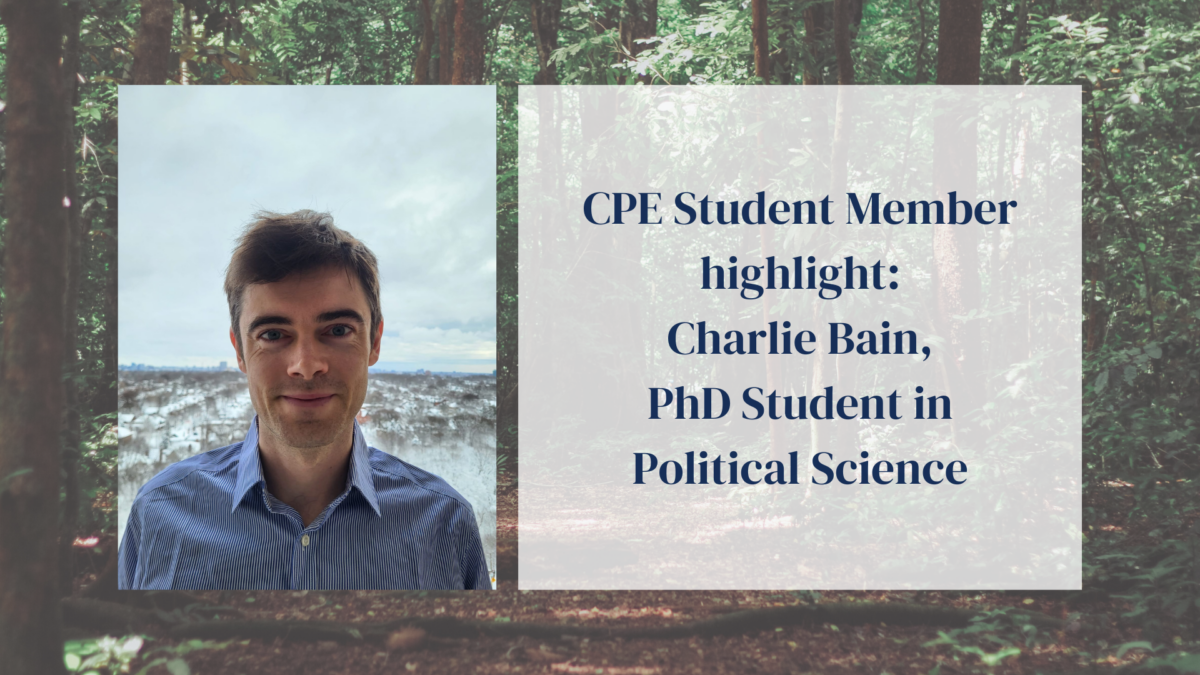
In 2022, Charlie was one of 13 University of Toronto graduate students to receive $15,000 from Climate Positive Energy to fund his research. Titled “The political economy of convertible firms: Electric utilities and automakers in climate politics,” Charlie’s research project involves looking at the climate behaviour of a leading group of global automakers and electric utilities from 2005 to 2021.
Charlie’s research journey was anything but linear. After completing his undergraduate degree in the UK, Charlie spent four years working for a financial technology company in Hong Kong.
“While I was working in Hong Kong, I got this itch. I felt like I wasn’t having conversations about things that were important, and the environment was one of those things.”
He found himself scratching that itch by pursuing a master’s in political science at the University of British Columbia in Vancouver. He credits a global environmental politics course taught by UBC professor Peter Dauvergne as the inspiration behind his continued studies: “I found it so fantastic, and I wanted to keep the momentum going by doing a PhD.”
“Since my master’s my two academic interests have been global environmental politics and the political influence of big business. I wanted to find some way of bringing those things together.”
Now pursuing a PhD in political science at the University of Toronto, Charlie is channeling his passion for sustainability into conversations about the environment. His research project seeks to explain variation in the climate policy stances taken by two different types of firms: electric utilities and automakers.
Many firms in both industries are in the process of shifting away from fossil fuel towards clean energy, with renewables serving as a pathway to decarbonization in the power sector and electric vehicles in the car sector. However, one of the main findings coming out of Charlie’s research is that not all firms with falling carbon emissions become more supportive of ambitious climate policy.
When it comes to predicting climate policy behaviour, “it’s important to understand the specific technology choices that firms have made. For example, many of the world’s largest car firms opposed climate policies in the 2010s because their investments in combustion engine improvements, diesel cars or hybrids were at risk of being made redundant faster than they expected by the rise of EVs.”
“There are two main steps to my research,” Charlie explains. “The first is trying to build a novel measure of the climate policy stances of 25 car and power firms over time, between 2005 and 2021. The second is to ask the question, ‘why are some of these firms more or less supportive than others when it comes to taking a stance on climate policies?’”
Charlie’s research is supervised by Jessica Green, Professor of Political Science at U of T. Charlie credits Professor Green for connecting him with Climate Positive Energy: “My supervisor forwarded the opportunity to me after it landed in her inbox. At first, I wasn’t sure the award was for me because it was coming out of the engineering department. But I’m glad I gave it a shot! It had a great impact on my university journey.”
As a result of the award, Charlie was able to accelerate progress on his research: “The financial contribution had a big impact when it came to making progress on my dissertation. CPE liberated me to focus much more on my own research.”
Charlie also presented at CPE’s inaugural Research Day in 2022, where he won a bronze-level prize for the effectiveness of his project pitch. “Research Day helped me to distill my research into a form that would be understandable to people outside political science. It made me think about my research in a different, more generalist way, and improved the way I communicate it.”
Looking to the future of his project, Charlie hopes that his findings will speak to debates about the role that big business will play in decarbonization. “There is a lot of positivity in some quarters about large firms and the fact that they will be key actors in decarbonization. I hope my research can answer questions around what kinds of companies can play a positive role in pro-climate political coalitions and, on the flipside, what barriers might prevent firms from being as supportive on climate policy as we hope.”
When asked if he has any advice for people looking to get involved in climate and sustainability research like he did, Charlie says, “Just do it! We need people working in this space, arguably more than any other space. I urge you to get involved and follow your passion.”
To learn more about Charlie’s research project, visit: https://cpe.utoronto.ca/project/electric-utilities-and-automakers-in-climate-politics/
Connect with Charlie on LinkedIn: https://www.linkedin.com/in/charlie-bain-2b55a644/